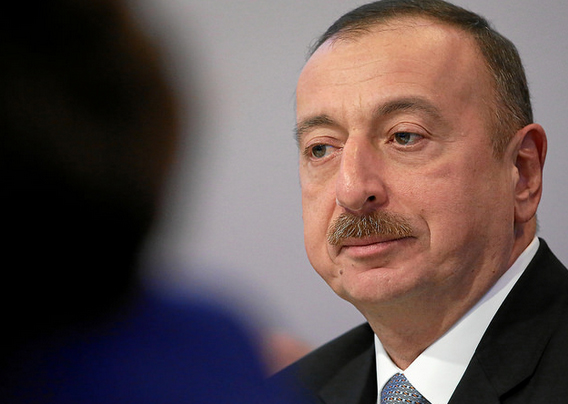Nagorno-Karabakh: Aliyev skips EU meeting, Stepanakert turned into a ghost town
Azerbaijan wanted Turkey to send a representative, but Germany and France were against it. This has delayed the quest for a diplomatic solution. Armenia is trying to meet to the immediate needs of some 100,000 refugees who are angry at the international community for abandoning them, several sources say. A representative of the International Committee of the Red Cross told AsiaNews that he found the city of Stepanakert, called Khankendi by Azerbaijanis, "deserted".
Granada (AsiaNews/Agencies) – The President of Azerbaijan, Ilham Aliyev, will not be in Granada (Spain) for a meeting with European leaders and Armenian authorities to discuss the future of Nagorno-Karabakh following the dissolution of the Republic of Artsakh.
Meanwhile, appeals for a negotiated solution are multiplying after the armed conquest of the enclave sparked the exodus of over 100,000 people to Armenia.
The Presidency of the Council of European Bishops' Conferences (CEBC) added its appeal, asking “the international community to alleviate the humanitarian emergency of the hundreds of thousands of displaced” and protect “the Christian heritage in Nagorno Karabakh”, including some 1,456 Armenian monuments now “under Azerbaijan's control after the ceasefire in 2020 [. . .] already damaged during the war”.
The CEBC also expressed hope that “international bodies will find a negotiated solution that guarantees the safety of the displaced and their right to return to the lands where they grew up with their traditions”.
Nagorno-Karabakh, known as Artsakh in Armenian, is a region with a Christian Armenian majority, included within the borders of Azerbaijan by Stalin, who divided the region in the early 1920s.
Tensions began to grow after the dissolution of the USSR in 1989-91.
Before the final, lightning, 24-hour offensive, on 19 September, the Lachin corridor connecting Nagorno-Karabakh to Armenia had been blocked for 10 months, and diplomatic efforts by the European Union had failed to overcome the stalemate,
The previous war in 2020 had ended in a fragile truce after 44 days.
Azerbaijani President Aliyev had considered taking part in talks with the leaders of France, Germany, Armenia and EU President Council Charles Michel, but had asked that Turkey also be present at the meeting.
Germany and France turned down that request, while France announced that it would continue supplying military equipment to Armenia, further irritating Azerbaijan.
Meanwhile, Armenian authorities are trying to cope with the immediate needs of the refugees, especially as winter approaches.
According to experts, it is clear that the refugees will not return to the territory now controlled by Azerbaijan, despite promises by Azerbaijani officials of “equal rights and freedoms of everyone” in Nagorno-Karabakh, “regardless of ethnic, religious or linguistic affiliation”.
For the International Crisis Group, “the promises made [by Azerbaijan] are insufficient to build trust” after decades of tensions.
According to Tigran Grigoryan, head of the Regional Center for Democracy and Security, a think tank in Yerevan, the local population feels that “they have been left behind, basically, by the whole world - by the international community, partly by the government of Armenia.”
For Goris Deputy Mayor Irina Yolyan, “Thousands of families are now homeless. Azerbaijan is like a steamroller across the asphalt. Nothing is stopping them, and this situation creates a great unhappiness, a great discontent with territorial losses and the sheer level of human suffering.”
UN experts, who arrived for the first time in 30 years, estimate that 50 to 1,000 Armenians remain in the region.
Marco Succi, head of the rapid reaction team of the International Committee of the Red Cross (ICRC), said he found a "surreal situation" upon his arrival on 22 September in the region’s largest city, known as Stepanakert in Armenian and Khankendi in Azeri.
"The city is empty and almost deserted," he told AsiaNews. "At present, there are only a few dozen people left who did not want to leave or vulnerable individuals who could not escape, mostly the elderly, bedridden patients or mentally disabled people."
Some people were found to be severely malnourished. Communication links have been blown up, so those who have remained cannot contact those who have left the region.
“The electricity grid is still working, as is the water network, but we don't know the quality of the water," Succi continued. "Hospitals don't work, there are only five Azerbaijani ambulances operating in a limited manner."
The CIRC, present in Nagorno-Karabakh since the start of tensions in 1992, acts as a neutral player between Armenia, which has always been supported by Russia, and Azerbaijan, dealing with the evacuation of the wounded and the search for the missing.
The next step will be to reach the villages and towns involved in the last phase of the offensive.
“We are evaluating with the de facto authorities if and when we can reach these locations,” Succi explained. “There, too, we expect to find vulnerable people like those left here.”
“As for the dead, however, it will be necessary to proceed with identification and then guarantee a dignified burial,” added the Red Cross team leader.
"In the event of armed conflict, like last time in 2020, it is always possible to proceed with search and rescue operations with a team composed of Azerbaijanis, Armenians and Russians, [the latter are] present as peacekeepers. We would like to recreate those teams even now."
15/06/2021 10:58
15/10/2020 09:27
10/10/2020 09:54







.png)










